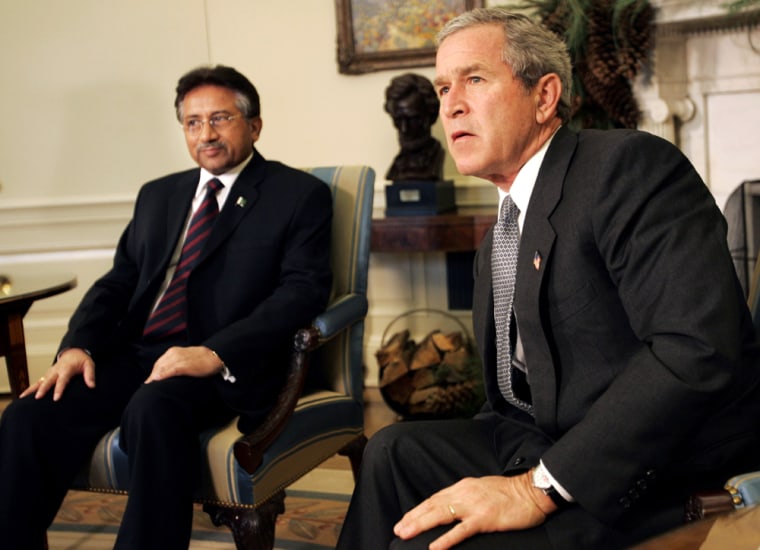President Bush offered no criticism Saturday of Pakistan's role in the still-unsuccessful hunt for al-Qaida leader Osama bin Laden, even though Pakistan's army is pulling back from the region where the terrorist mastermind is believed hiding.
After an Oval Office meeting with Pakistan's president, Gen. Pervez Musharraf, Bush said, "His army has been incredibly active and very brave ... flushing out an enemy that though they had found safe haven."
Bush characterized Musharraf as "a determined leader to bring to justice not only people like Osama bin Laden but to bring to justice those would inflict harm and pain on his own people. ... I am very pleased with his efforts."
Withdrawing troops
Pakistan's army said last month it was withdrawing hundreds of troops from the tense tribal region near Afghanistan. The decision to pull back from the South Waziristan area come after several military operations by thousands of troops against remnants of bin Laden's al-Qaida organization and its supporters in recent months.
The architect of the Sept. 11 attacks against the United States, bin Laden has been on the run since U.S. forces invaded Afghanistan in October 2001 and drove out the Taliban rulers who harbored al-Qaida militants.
Between 7,000 and 8,000 Pakistani forces were deployed in a three-pronged offensive in the eastern reaches of the rugged region last month. U.S. military forces remain largely on the Afghanistan side in hopes of capturing or killing any al-Qaida operatives crossing the border.
White House press secretary Scott McClellan acknowledged Friday that the administration believes Pakistan could do more in the search for bin Laden, alleged mastermind of the Sept. 11, 2001, attacks.
Overall, McClellan said, the two countries enjoy “good, close cooperation.”
“We’re going to continue working closely with them,” he said. “We have good intelligence cooperation, and this is something that’s a priority for both our nations.”
Push towards democracy
The general, who seized power in a bloodless coup in 1999, had pledged in December 2003 to relinquish his army uniform by the end of the year as part of a commitment to civilian rule. His government pushed through a law this year, however, to allow him to keep the separate role. That caused some quiet unease that Pakistan wasn’t progressing toward democracy as had been hoped.
“We make our views very clear publicly and privately when it comes to our support for democracy and moving in that direction,” McClellan said. “And there’s some steps that Pakistan has taken. And we continue to talk to them about those issues.”
U.S. officials are always mindful of the need to avoid upsetting Pakistan’s delicate, turbulent internal politics, in which radical Islamic groups condemn Musharraf for backing the U.S.-led forces that ousted the Taliban militia from power in neighboring Afghanistan in 2001 and routed the al-Qaida fighters the Taliban had sheltered.
Reports ahead of Saturday’s meeting talked of an impending deal for the United States to sell military surveillance airplanes, anti-tank missiles and other weapons worth more than $1 billion to Pakistan. McClellan said no announcement was imminent.
Musharraf scheduled a meeting with Secretary of State Colin Powell later Saturday.
